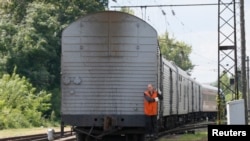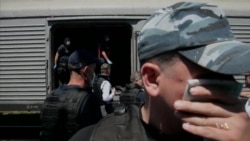U.S. intelligence officials say they have no evidence of direct Russian involvement in the shootdown of that Malaysian airliner in eastern Ukraine last week. They say ill-trained pro-Russian rebels likely downed the jetliner by mistake.
Officials briefed reporters on the July 17 disaster Tuesday in Washington, asking that their names not be used in connection with the preliminary findings. They said the passenger jet with 298 people on board was likely downed by separatists firing a Russian SA-11 surface-to-air missile. There were no survivors.
The officials also said they do not know whether any Russians were present when the missile was launched. But they said Moscow "created the conditions" that led to the shootdown.
In the past five days, the United States, Ukraine and a host of European governments have accused Moscow of supplying the missile battery that downed the plane.
Authorities also have accused separatists of moving that missile battery back into Russian territory after the shootdown.
Earlier Tuesday, a train carrying bodies and flight data recorders collected from the crash site arrived in the government-controlled Ukraine city of Kharkiv.
Upon arrival, the head of an international team of forensic experts raised questions about the precise number of bodies recovered from the crash site near the Russian border.
Pro-Russian rebels accused of downing the plane said Monday that 282 bodies and the parts of 16 others were aboard the train. But Dutch forensics team leader Jan Tuinder, who met the train in Kharkiv, said the refrigerated rail cars contained only 200 bodies.
The discrepancy had not been resolved by early Wednesday, and there was no immediate comment from rebels or the Kyiv government.
In Moscow, Russian President Vladimir Putin promised Tuesday to do everything in his power to influence separatists controlling the crash site to allow a full investigation into the disaster. But he said such efforts would be inadequate without additional pressure on Kyiv to end the hostilities.
(see full list of passengers here)
Deputy Prime Minister Volodymyr Groysman confirmed that the bodies were aboard refrigerated rail cars that arrived in Kharkiv Tuesday morning. He would not confirm earlier reports that there are also 87 body parts that officials believe come from the remaining 16 victims.
Groysman told a news conference in Kharkiv that Malaysian officials who accompanied the bodies from rebel-held territory have the aircraft’s flight recorders, and they are working with Dutch and international investigators to decide where their contents will be evaluated.
International police agency Interpol said that, along with other expert teams, it started identifying some of the bodies. A fuller identification will be carried out in the Netherlands, the agency said.
Crash site access
Groysman also spoke about the next steps in the investigation.
“The most important issue for today is to get access to the crash site to do the professional work, and everything, according to the legislation of Ukraine, and under the guidance of authorized agencies,” said Groysman.
The White House Tuesday also emphasized the need for “immediate and full access'' to the crash site.
Welcoming news of the victim’s remain being transferred to the Netherlands, White House spokesman Josh Earnest said the U.S. has not yet seen “the level of cooperation with international investigators that we'd like to see.''
Officials from many countries say evidence at the site has already been disturbed by large numbers of local villagers and untrained volunteers who were allowed to walk around it and remove items. Ukraine accuses Russia and the separatists of destroying and manipulating evidence.
Ukraine gave up the international lead in the investigation on Monday, a move that apparently resolved the dispute that kept the bodies on the train near the crash site for two days. The Netherlands now has the lead and is expected to perform the forensic identification of the bodies at a facility in Amsterdam.
Russia pledges cooperation
Also Tuesday, Russian President Vladimir Putin promised in televised comments to do everything in his power to influence the pro-Russian separatists controlling the area to allow a full investigation into the downing of the airliner. But he said such efforts would be inadequate without additional pressure on Kyiv to end the hostilities.
"Ultimately, there is a need to call on the authorities in Kyiv to respect basic norms of decency, and at least for a short time implement a cease-fire for the investigation,'' he said.
Putin has said repeatedly that the airliner would not have gone down if Ukraine had not re-ignited fighting last month in the region with separatists.
Ukraine ended a unilateral cease-fire June 30 saying it found itself under continued attacks by rebels, suffering substantial losses. The West has supported Ukraine's right to defend itself.
The Malaysia Airlines passenger jet was shot down last Thursday. Officials in Ukraine, the United States and the European Union say the plane was hit by a surface-to-air missile as it flew over eastern Ukraine. Kyiv says the plane was downed by separatists with a "Buk" missile provided to them by Russia, a claim widely supported in the West. Moscow, meanwhile, points its finger at Ukraine, saying that it spotted a Ukrainian fighter jet in the vicinity of the passenger plane before it was downed, a claim denied by Kyiv.
UN Security Council
The handover of the bodies and black boxes, and reports by international investigators of improved access to the wreckage of the airliner four days after it was shot down, occurred against calls for broader sanctions against Russia for its alleged instigation and support of the rebellion in Ukraine's east.
The U.N. Security Council on Monday unanimously condemned the airliner's downing and demanded that pro-Russian separatists controlling the crash site allow investigators unrestricted access to the area.
U.S. President Barack Obama, speaking from the White House Monday, said "the burden now is on Russia to insist that the separatists stop tampering with the evidence, grant investigators who are already on the ground immediate, full and unimpeded access to the crash site."
Netherlands Foreign Minister Frans Timmerman called the delay in granting access a "despicable" political game.
"To my dying day, I will not understand that it took so much time for the rescue workers to be allowed to do their difficult jobs, and that human remains should be used in a political game," he said. "... It is despicable."
More penalties for Russia considered
The U.S. is considering “additional costs” on Russia, the White House said Tuesday. Washington had imposed its latest round of sanctions last Wednesday, a day before the downing of MH17.
“Our willingness to consider adding additional costs is something that continues to be a live option,” White House spokesman Josh Earnest told reporters, adding that he U.S. also would welcome such steps from Europe.
Meanwhile, European Union foreign ministers were meeting in Brussels Tuesday to discuss further penalties against Russia. For the first the time they raised the possibility of restricting Russia's access to European capital markets, defense and energy technology, but approval of such sanctions still faces hurdles as it requires broad consensus on the highest levels.
However, EU countries are expected to speed up implementation of sanctions against individuals, and possibly companies, agreed to in principle last week before the airliner's downing.
Britain’s new Foreign Secretary Phillip Hammond said his country would want the “cronies” surrounding President Putin to bear the pressure of additional punitive measures.
Lithuanian Foreign Minister Linas Linkevicius blamed "terrorists supplied by Moscow" for the airliner's destruction and the deaths of all 298 people aboard. He said he hoped the meeting would lead to beefed-up sanctions against Russia.
Linkevicius called for an arms embargo - a direct challenge to France, which is building two warships for the Russian navy. Amid protests, it has cleared one of the ships for delivery.
Several EU foreign ministers said Tuesday the bloc needs to consider an arms embargo against Russia following the downing of the plane.
VOA's Al Pessin contributed to this report from Kyiv. Some information was provided by Reuters, AFP and the Associated Press.
WATCH: Related video by Zlatica Hoke







